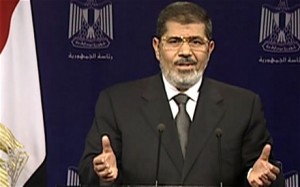 Egypt’s deposed president Mohamed Morsi is being detained in a military facility and arrest warrants have been issued for 300 members of the Muslim Brotherhood after the army took control of the country following a week of protest.
Egypt’s deposed president Mohamed Morsi is being detained in a military facility and arrest warrants have been issued for 300 members of the Muslim Brotherhood after the army took control of the country following a week of protest.
“Morsi has been separated from his aides and was taken to the defence ministry,” said Gehad El-Haddad, a senior Muslim Brotherhood official and son of a top Morsi aide. His father, Essam El-Haddad, widely seen as Mr Morsi’s right-hand man, was among those held, he added.
The army confirmed it was “preventively” holding Mr Morsi and hinted he may face formal charges over accusations made by his opponents.
“He is being held preventively for final preparations,” an army spokesman said.
Mr Morsi’s top aides have switched off their phones. Other presidential aides who were separated from Mr Morsi earlier in the day said they had lost communication with their leader.
Mr Morsi had earlier been at his office in the Republican Guard’s headquarters, before he was moved.
Police have already arrested Saad al-Katatni, head of Mr Morsi’s Freedom and Justice Party, and Rashad Bayoumi, the Muslim Brotherhood’s deputy supreme guide, and have orders to arrest another 300 members of the organisation.
Mr Morsi, Egypt’s first democratically elected leader, was decisively ejected from power earlier in the day after the army flooded the streets of Cairo and announced a new interim government.
Mr Morsi, who had earlier refused to resign, was told at 7pm local time he was no longer president as Egypt’s military seized control in a coup.
As the streets of Cairo erupted in jubilation, Gen Abdulfattah al-Sisi, the head of the army, made a televised address to the nation accusing Mr Morsi of rejecting calls for national dialogue.
Backed by the main religious leaders, Ahmed al-Tayyeb, the Grand Imam of Al-Azhar University, and Pope Tawadros II of the Coptic Church, he said the military was taking up its “patriotic duty to the Egyptian masses”.
He announced a political road map suspending the constitution, forming an interim government, and leading to elections. He appointed chief justice of the constitutional court, Adly Mansour, interim president with “full powers of decree”.
The leaders of Mr Morsi’s Muslim Brotherhood party were banned from leaving the country, with airports put on alert. Local media reported that Mohammed Badie, the group’s Supreme Guide, was turned back from the Libyan border.
The plug was pulled on a Brotherhood television station, and Al-Jazeera’s local station was raided.
Mr Morsi denounced the move as “illegal” and urged Egyptians to “peacefully resist the coup as he himself will do”. Later a pre-recorded tape was played to supporters near the presidential palace in which he said he was still president and asked them to defend his “legitimacy”.
The opposition leader, Mohamed ElBaradei, was consulted in advance of the announcement, which was met with fireworks by crowds in Tahrir Square and outside the presidential palace.
Mr Morsi had held talks with Gen Sisi, the defence minister, during the day, but pulled out at lunchtime after it became clear he was not going to be able to cling to office.
As dusk fell, convoys of troops poured through the centre of the capital. Armoured personnel carriers took up position on bridges. They were cheered as they passed anti-Morsi protesters. In the north-west suburb around the presidential palace soldiers set up barriers to keep pro-Morsi demonstrators away from the Republican Guard buildings, where Mr Morsi was rumoured to be holding out or under house arrest.
Britain said it opposed military intervention but stopped short of condemning the step. “The situation is clearly dangerous and we call on all sides to show restraint and avoid violence,” William Hague, the Foreign Secretary, said.
The army’s move will now put great pressure on President Barack Obama, who had urged a negotiated solution.
Mr Obama said he had ordered a review into the $1.5 billion (£980 million) in US foreign aid to Egypt after Mr Morsi was ousted.
The US president said he was “deeply concerned” by the military’s move, but he stopped short of calling it a coup. By law, the US must suspend aid to any country whose elected leader is ousted in a military coup.
There will also be fears of violence, or even civil war. Muslim Brotherhood supporters said they would sacrifice their lives to defend Mr Morsi’s “legitimacy”. There were clashes across the country last night, with at least ten deaths reported.
Mr Morsi and his advisers traded verbal blows all day with Gen Sisi, who made the decision on Monday to step in and force a change in government. He had given Mr Morsi two days to propose a compromise solution. Given that the opposition had said it would accept nothing short of his removal from office, that was unlikely to succeed.
The Telegraph

Leave a Reply
You must be logged in to post a comment.